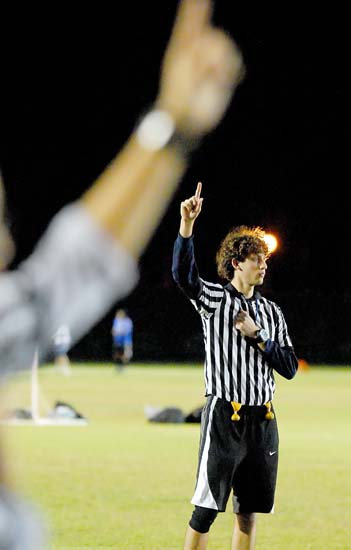UCLA intramural sports referees face multiple pressures

By Mansi Sheth
Nov. 18, 2009 10:05 p.m.
On a cool Wednesday evening, first-year undeclared student Brett Billet grabs his shoes and jersey as he heads out to the Intramural Field, where students are warming up for intramural flag football.
Instead of joining the group of players casually tossing around the pigskin, Billet adjusts his black-and-white striped shirt and pulls out his whistle.
As a new referee with no prior experience, Billet is relying on minimal training to officiate IM flag football games, where tempers sometimes run high, and frustration is often directed toward the student with the whistle.
New referees are placed under a significant amount of pressure during their first few games.
With recent budget cuts prompting a decrease in practical training, referees like Billet are thrown into the hostile environment of an IM game with even less experience.
Although cutbacks concerning IM sports officials were made last year, the consequences of the budget cuts are likely to make a bigger difference to students this year as intramural sports experience reductions in the number of referees officiating a game.
Volleyball is now self-officiated, while softball and soccer will have one official present instead of two. Flag football and 5-on-5 basketball, however, still have three referees officiating at each game.
The budget cuts have also affected referee turnover.
“We definitely struggle with retention from year to year,” said Competitive Sports Coordinator Adam Pruett. “Especially since it’s difficult to pay at a higher rate.”
Offered only as work-study, refereeing attracts approximately 150 students annually.
However, many do not stay around long enough to reap the full benefits of the job, which include a pay raise and opportunities to referee outside of IM games. As a result, there are fewer experienced referees officiating IM games.
Additionally, new referee training has been reduced significantly since last year, going from between 12 and 15 hours to just four hours. For referees with little background in the sport they are officiating, the reduction in hours is especially harsh.
“Sometimes it’s really hard, because people have to learn a sport fully within a week,” Pruett said.
New officials are forced to learn complicated rules quickly with only about a week of training that consists of classroom instruction and a few scrimmage games.
Reduced training may also be potentially linked to the declining retention of referees. Within just two weeks of being hired, newly trained referees are forced to officiate IM games.
These referees are often unaccustomed to the fast pace of games and are more likely to make small mistakes.
After one or two unpleasant experiences with angry players, some of the newly trained referees no longer want to officiate games.
“It can be difficult to referee,” said Nicole Wong, a sports official supervisor and student. “It’s very authoritative. Not everyone is able to deal with it.”
Despite the decreased training for new referees, they still have opportunities to improve their skills.
A majority of the training that was cut from the classroom is now done online but is optional.
In addition, supervisors continually evaluate referees throughout the season.
As sports officials become more experienced, they are given the opportunities to referee IM playoffs, and some are even selected to officiate at regional tournaments.
“Ultimately, it comes down to the amount of dedication referees want to put in,” Wong said.
Budget cuts and reduced training aside, being an IM referee is tough, Pruett said.
“It’s one of the most difficult things to officiate your peers,” he said.
Officials often have to deal with passionate students in highly competitive games.
“Players can get forceful and aggressive,” Wong said. “People think they can push you over, but you have to be firm.”
Regardless of sport, most referees have had at least one unpleasant encounter with an irate player.
“In my first game, there was a lot of arguing going on, it got pretty heated,” said Leo Chusan, an indoor soccer referee who just began officiating games this quarter.
During a flag football game, Billet was forced to eject an upset player for accidently tampering with his flags.
“He had just scored a touchdown and was really angry. I had no choice, because that’s the rules. He was really mad and tried to argue, but I had to do my job,” he said.
Despite decreased training, Billet maintains that learning in action is key.
“I’ve only done a couple games and I’m already better,” he said. “Nothing else really matters. The more games I referee, the easier it becomes.”


